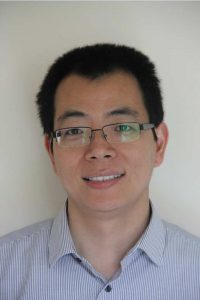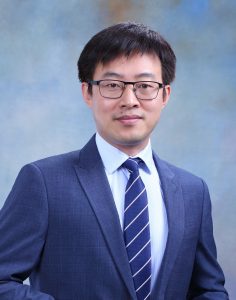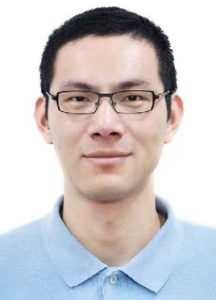 Professor Zhiguo Ding
Professor Zhiguo Ding
Title: Recent Advances in Non-Orthogonal Multiple Access in 6G Wireless Networks
Bio:
Zhiguo Ding received his B.Eng in Electrical Engineering from the Beijing University of Posts and Telecommunications in 2000, and the Ph.D degree in Electrical Engineering from Imperial College London in 2005. From Jul. 2005 to Apr. 2018, he had been working in Queen’s University Belfast, Imperial College, Newcastle University and Lancaster University. Since Apr. 2018, he has been with the University of Manchester as a Professor in Communications. From Oct. 2012 to Sept. 2022, he has also been an academic visitor in Prof. Vincent Poor’s group at Princeton University.
Dr Ding’ research interests are machine learning, B5G networks, cooperative and energy harvesting networks and statistical signal processing. His h-index is 76 and his work receives 25,000+ Google citations. He is serving as an Area Editor for the IEEE OJ-COMS, an Editor for IEEE TVT and OJ-SP, and was an Editor for IEEE TCOM, IEEE WCL, IEEE CL and WCMC. He received the best paper award of IET ICWMC-2009 and IEEE WCSP-2014, the EU Marie Curie Fellowship 2012-2014, the Top IEEE TVT Editor 2017, IEEE Heinrich Hertz Award 2018, IEEE Jack Neubauer Memorial Award 2018, IEEE Best Signal Processing Letter Award 2018 ,and Alexander von Humboldt Foundation Friedrich Wilhelm Bessel Research Award 2020. He is a member of the Global Research Advisory Board of Yonsei University, a Web of Science Highly Cited Researcher in two disciplines (2019-2021), an IEEE ComSoc Distinguished Lecturer, and a Fellow of the IEEE
Abstract:
With the current rollout of 5G, the focus of the research community is shifting towards the design of the next generation of mobile systems, e.g., 6G mobile networks. Non-orthogonal multiple access (NOMA) has been recongized as an essential enabling technology for the forthcoming 6G networks to meet the heterogeneous demands on low latency, high reliability, massive connectivity, improved fairness, and high throughput. The principle of NOMA is to encourage users for spectrum sharing, where multiple users are served in the same resource block, such as a time slot, subcarrier, or spreading code. The aim of this talk is to provide an overview of the latest research results and innovations in NOMA technologies as well as their emerging applications, including machine learning, backscatter communications (BackCom), intelligent reflecting surfaces (IRS), mobile edge computing (MEC), etc. Future research challenges regarding NOMA in B5G and 6G are also presented.
 Professor Haijun Zhang
Professor Haijun Zhang
Title: AI based 6G networks
Bio:
Haijun Zhang (M’13, SM’17) is currently a Full Professor and Associate Dean in both of School of Computer and Communications Engineering and Graduate School of Artifitial Intelligence at University of Science and Technology Beijing, China. He was a Postdoctoral Research Fellow in Department of Electrical and Computer Engineering, the University of British Columbia (UBC), Canada. He serves/served as Track Co-Chair of WCNC 2020/2021, Symposium Chair of Globecom’19, TPC Co-Chair of INFOCOM 2018 Workshop on Integrating Edge Computing, Caching, and Offloading in Next Generation Networks, and General Co-Chair of GameNets’16. He serves as an Editor of IEEE Transactions on Communications, IEEE Transactions on Network Science and Engineering, and IEEE Transactions on Vehicular Technology. He received the IEEE CSIM Technical Committee Best Journal Paper Award in 2018, IEEE ComSoc Young Author Best Paper Award in 2017, and IEEE ComSoc Asia-Pacific Best Young Researcher Award in 2019.
Abstract:
This talk will identify and discuss technical challenges and recent results related to the AI based 6G networks. The lecture is mainly divided into four parts. In the first part, this talk will introduce 6G and AI, discuss about the AI enabled 6G mobile networks architecture, and provide some main technical challenges in AI based 6G networks. In the second part, this talk will focus on the issue of AI based resource management in 6G networks and provide different recent research findings that help us to develop engineering insights. In the third part, this talk will address the MAC layer design in AI based 6G networks and address some key research problems. In the last part, this talk will summarize by providing a future outlook of AI based 6G networks.
 Professor Yuan Wu
Professor Yuan Wu
Title: Green Federated Learning: A Wireless Power Transfer Approach
Bio:
Yuan Wu (M‘10-SM’16) is currently an Associate Professor with the State Key Laboratory of Internet of Things for Smart City, University of Macau, Macao, China, and also with the Department of Computer and Information Science, University of Macau. He received the PhD degree in Electronic and Computer Engineering from the Hong Kong University of Science and Technology in 2010. From 2016 to 2017, he was a visiting scholar with Department of Electrical and Computer Engineering, University of Waterloo, Canada. Dr. Wu is currently on the editorial board of IEEE Transactions on Vehicular Technology, IEEE Transactions on Network Science and Engineering, IEEE Internet of Things Journal, and China Communications. He received the Best Paper Award from the IEEE ICC’2016, WCSP’2016, IEEE TCGCC’2017, IWCMC’2021, and DCN in 2021.
Abstract:
The past decades have witnessed a growing development of distributed Machine Learning (ML) with its applications in various wireless services. As one of the key paradigms of distributed ML, Federated learning (FL) allows a group of end-devices to report their locally trained models to a central parameter-server for aggregating the global model, instead of directly sending the raw data to the central parameter-server, which thus brings the advantages of preserving the data privacy of the end-devices as well as saving the bandwidth consumption for delivering the raw data to the parameter-server. However, periodically executing the local model training as well as reporting the trained model-data to the parameter-server result in significant energy consumption to end-devices which usually suffer from limited energy capacities. To address this challenging issue, this talk will focus on the discussions on the design of green Federated Learning. In particular, we will leverage the recently advanced wireless power transfer to enable a sustainable and efficient federated learning and illustrate the joint optimization of wireless power transfer strategy, learning strategy, and resource allocations.

